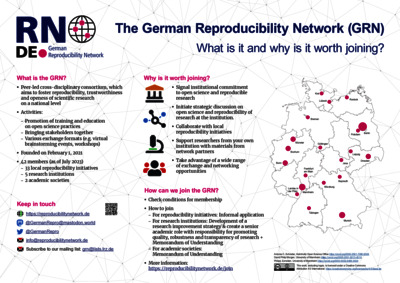|
The German Reproducibility Network (GRN). What is it and why is it worth joining?
Schrader, Antonia C.
;
Morgan, David Philip
;
Zumstein, Philipp
![[img]](https://madoc.bib.uni-mannheim.de/66277/1.hassmallThumbnailVersion/The%20German%20Reproducibility%20Network%20%28GRN%29.pdf)  Vorschau |
|
PDF
The German Reproducibility Network (GRN).pdf
- Veröffentlichte Version
Download (237kB)
|
|
DOI:
|
https://doi.org/10.5281/zenodo.10036434
|
|
URL:
|
https://zenodo.org/records/10036434
|
|
URN:
|
urn:nbn:de:bsz:180-madoc-662771
|
|
Dokumenttyp:
|
Präsentation auf Konferenz
|
|
Erscheinungsjahr:
|
2023
|
|
Veranstaltungstitel:
|
International Data Week 2023, RDA's 21st Plenary
|
|
Veranstaltungsort:
|
Salzburg, Austria, Hybrid
|
|
Veranstaltungsdatum:
|
23.-26.10.2023
|
|
Verlag:
|
Zenodo
|
|
Verwandte URLs:
|
|
|
Sprache der Veröffentlichung:
|
Englisch
|
|
Einrichtung:
|
Zentrale Einrichtungen > UB Universitätsbibliothek
|
|
Bereits vorhandene Lizenz:
|
 Creative Commons Namensnennung 4.0 International (CC BY 4.0) Creative Commons Namensnennung 4.0 International (CC BY 4.0)
|
|
Fachgebiet:
|
000 Allgemeines, Wissenschaft
|
|
Abstract:
|
The German Reproducibility Network (GRN) is a peer-led cross-disciplinary consortium which aims to increase trustworthiness and transparency of scientific research in Germany and beyond. The GRN's activities include the promotion of Open Science training and dissemination of best practices for reproducible and transparent research by bringing together stakeholders in this field to facilitate various exchange formats and synergy effects.
Prospective members of the GRN can be reproducibility initiatives, research institutions, or academic societies. In this poster we focus on the membership procedure for research institutions, such as universities and non-university organizations, and inform prospective members why one's own institution should become a member of the GRN. During the application process applicant research institutions must 1) Develop a Research Improvement Strategy geared towards the expansion and adoption of Open Science practices at their institute; 2) create a senior academic role to fulfill that strategy; and 3) agree upon a Memorandum of Understanding detailing strategic cornerstones geared towards Open Science with the GRN Steering Committee which will be reviewed after 5-years of membership. This poster can therefore be a good occasion to enter into further discussion about applying to become a member in addition to outlining the benefits of joining. Indeed, on the one hand, such a membership is a strong public signal that the institution stands up for the values of open and reproducible science. On the other hand, the GRN offers a variety of exchange and networking opportunities and the possibility of knowledge transfer of the best open and reproducible research practices between institutions and across disciplinary boundaries. For example, in May 2023 the GRN organized a symposium on education and reproducibility in Berlin, Germany. The symposium allowed for an exchange of experiences, good practices and efforts on education and teaching formats on reproducibility. Speakers from 15 different reproducibility and open science initiatives all over Europe presented their best practices for teaching (e.g. Version control of code and data using Git and DataLad, Training of Spanish speaking researchers with "learning-p2i.eu" course on FAIR principles).
The GRN wants to bring Open Science aspects more strongly into the political debate within Germany. The framework conditions in the science system influence the prioritization of scientists for different research activities. Open and reproducible practices must find their way into the incentive systems of science and the publication system must be designed accordingly. The GRN would like to focus on this discussion in the future. An exchange with research data experts could be very fruitful here.
|
 | Das Dokument wird vom Publikationsserver der Universitätsbibliothek Mannheim bereitgestellt. |
 Suche Autoren in Suche Autoren in
Sie haben einen Fehler gefunden? Teilen Sie uns Ihren Korrekturwunsch bitte hier mit: E-Mail
Actions (login required)
 |
Eintrag anzeigen |
|
|
 ORCID: 0000-0002-6485-9434
ORCID: 0000-0002-6485-9434



 Creative Commons Namensnennung 4.0 International (CC BY 4.0)
Creative Commons Namensnennung 4.0 International (CC BY 4.0) Suche Autoren in
Suche Autoren in